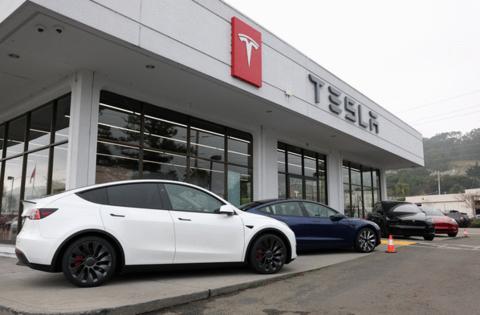Tesla stock dips as second-quarter earnings reduce investor confidence
Published in Business News
Tesla shares tumbled Thursday after its latest earning results knocked the wind out of investors' confidence in Elon Musk's electric vehicle maker.
The company has been facing intense competition, cooling consumer interest and a reduction of the government incentives that made buying EVs more affordable.
Musk, the chief executive, broadcast that the tough times could continue as the $7,500 federal tax credit for electric vehicle purchases is scheduled to be eliminated in fall.
"We probably could have a few rough quarters," he said on the company's earnings call. "I'm not saying that we will, but we could."
Tesla shares slid more than 8% Thursday. They have fallen more than 19% this year compared with a 9% gain in the tech-heavy Nasdaq index.
Tesla announced Wednesday that its automotive sales totaled $16.6 billion in the second quarter, a 16% drop from last year. Total revenues declined 12% from last year to $22.5 billion. The company's gross profit fell 15% compared with last year.
Musk was one of the biggest supporters of Donald Trump's bid for reelection and spent several months helping lead the so-called Department of Government Efficiency. That foray into politics damaged Tesla's reputation with some consumers. By aligning himself with the president, Musk alienated many liberal-leaning customers who were drawn to electric vehicles for their environmental benefits.
Some celebrities made a public show of ditching their Teslas, while some investors criticized the executive for turning his attention away from his company. Musk has since fallen out of favor with the administration and has feuded with Trump over policy. Tesla's brand continues to deteriorate as they trade insults over social media, experts said.
As vehicle sales fall and interest in electric vehicles plateaus, Musk has banked his company's future on self-driving technology and robotics. Tesla bulls see these technologies as the next wave of eventual profit and growth for the company that will carry it into the future.
Tesla launched a robotaxi service this year in Austin, Texas, but it has taken it longer than expected to get vehicles on the road. At this point, Tesla's efforts seem far behind the front-runner Waymo, which is backed by Alphabet.
Musk has long touted the capabilities of "Full Self-Drive mode," a semi-autonomous feature available in Teslas already on the road. Several incidents have been reported by drivers using the feature, and it's unclear if the same technology powers Musk's robotaxis in Austin.
"If Tesla continues to execute well with vehicle autonomy and humanoid robot autonomy, it will be the most valuable company in the world," Musk said on the earnings call. "I am extremely optimistic about the future."
Musk has made lofty claims about Tesla's autonomous driving technology for years. He faces a lawsuit from the Department of Motor Vehicles accusing the company of leading buyers to believe that its vehicles can operate autonomously.
Still, Tesla analyst Dan Ives said in a note Thursday that autonomous technology could be a $1-trillion opportunity.
"The upcoming quarters will be critical for Tesla on the autonomous front as Musk and co. aim to have autonomous ride hailing in half the U.S. population by the end of 2025," Ives said in a note.
According to some experts, widespread autonomous driving technology won't be available for 15 more years, casting doubt on Tesla's plan to fuel profits with self-driving services.
©2025 Los Angeles Times. Visit at latimes.com. Distributed by Tribune Content Agency, LLC.












Comments